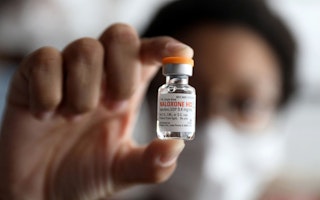Better Safe than Sorry in Addiction Research
By Daniel Wolfe
In an era when politicians pledge allegiance to a "drug-free" world and Big Pharma seeks new markets for new products, addiction research is a tricky business. A study published this week in The Lancet [subscription required] found that people abstained from using heroin and other opioids when taking a once-monthly, injectable form of the medication naltrexone. Disturbing, however, was the decision of study sponsors to offer nothing more than a placebo and counseling to some trial participants, and not to report what happened to the many who dropped out of the trial.
Researchers also didn't detail whether follow-up was done to monitor for post-treatment opioid overdose among participants. As I and other co-authors argued in a commentary linked to the Lancet article, the U.S. Food and Drug Administration, which approved the efficacy of the medicine for opioid users based on this one trial in Russia, should have demanded more data and higher ethical standards before giving marketers the green light.
While use of injectable naltrexone in opioid dependence is new, the FDA’s own Adverse Event Reporting System has recorded 51 fatal reports associated with injectable naltrexone since it was approved for alcoholism dependence—a magnitude of unlabeled adverse events that in the past has triggered black-box warnings for other drugs. Further, a review of 13 trials on opioid substitution treatment options in Australia found that patients on oral naltrexone were three times more likely to experience heroin overdose than those on opioid-agonist medications, such as methadone and buprenorphine. When a patient had stopped taking naltrexone, the risk of overdose rose eightfold.
In light of such evidence, the FDA must explain why it required just one study before declaring this medication safe to use.
Also left unanswered is how the study’s authors deemed it ethical to expose some trial participants to placebo. In 1964, the World Medical Association issued guidelines for ethical research known as the Helsinki Declaration. One of the declaration's key principles holds that use of a placebo in clinical trials is unjustified when there is a demonstrated standard of treatment.
In the case of addiction to heroin and other opioids, earlier studies have shown the effectiveness of the medicines methadone and buprenorphine, and demonstrated the perils of making clinical trial participants go without. Inexplicably, investigators chose to conduct the trial in Russia, where authorities outlaw use of methadone or buprenorphine. Taking Russian data and using it to seek marketing approval in the U.S. represents a particularly insidious and ethically questionable “bait and switch.”
Injectable naltrexone is now being marketed to heroin addicts at as much as a whopping $1,100 per month. One hopes that the rush to market does not mean that desperate patients end up paying an even steeper, fatal price.

Until December 2021, Daniel Wolfe was director of the International Harm Reduction Development Program at the Open Society Foundations.

